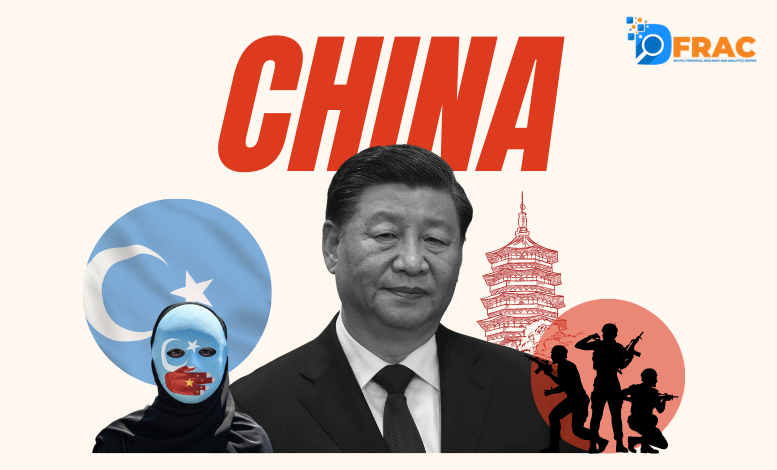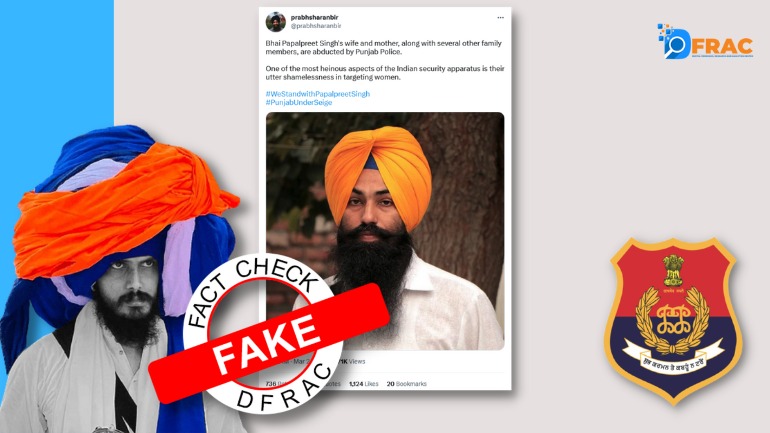In recent developments, efforts have been made by DFRAC team to address the dissemination of content by the Chinese Twitter army that pertains to the atrocities and torture endured by Uyghur Muslims.
China has faced allegations of engaging in torture, committing atrocities, violating human rights, and perpetrating massacres against Uyghur Muslims through the establishment of detention centers. Reports have emerged indicating that the religious freedoms of Muslims are being infringed upon, with Uyghur Muslims being prohibited from observing fasting during Ramadan and even the simple act of cultivating a majestic beard is deemed forbidden.
The concerns surrounding the violation of human rights for Uyghur Muslims are not unfounded, as it was disclosed to the United Nations Human Rights Committee in August 2018 that the entire Uyghur Autonomous Region has been transformed into a sprawling detention center, with approximately one million individuals enduring a life of detainment and experiencing various forms of torture and anguish.
There is a growing chorus of voices on social media advocating for the rights of Uyghur Muslims. Many Uyghur Muslims who have sought refuge in other countries are using social media platforms to shed light on the brutal treatment inflicted upon them.
Yet, amidst this digital battlefield, a formidable force emerges – the Chinese Twitter Army. With a cunning agenda, they paint a deceptive picture of Xinjiang, proclaiming it as a haven of peace and progress under the Chinese regime. This Twitter army not only disseminates positive news, but also do the relentless trolling of those who dare to shed light on the persecution of Xinjiang and its Uyghur Muslim population. Their ultimate aim? To undermine the sympathy and support garnered by those who have been victimized by the government. This report provides a comprehensive account of the historical mistreatment of Uyghur Muslims, Chinese harassment, and the nefarious activities of the Troll Army.
The key highlights of this report encompass the following aspects:
- Historical background of the Uyghur Muslim community
- Masters of propaganda: Exposing the Chinese Twitter Army
- Muslim individuals subjected to Chinese torture and their tragic experiences
- The confinement hub and the religious censure
- Hateful social media content targeting the Uyghur community
Historical background of the Uyghur Muslim community
The Uyghur Muslim community has a significant historical presence in China’s Xinjiang province, which is situated in the western part of the country. The term “Xinjiang” is commonly interpreted as “border land,” as it shares borders with India, Afghanistan, and Mongolia. Initially, the Uyghur community declared itself as an independent and autonomous entity.
However, following the communist revolution in 1949, the province became integrated into China. Presently, approximately 10 million individuals from the Uyghur community reside in Xinjiang, with the majority practicing Islam. The Uyghur Muslims share cultural affinities with Central Asian nations, exhibiting similarities in language and lifestyle. It is also believed that Uyghur individuals previously resided in Kashmir before migrating to Xinjiang. The province’s economy has historically revolved around agriculture and trade, with the renowned Silk Route contributing to its prosperity. However, the Chinese government’s resettlement of individuals from the Han ethnic group, which constitutes the majority in China, has presented numerous challenges for the Uyghur Muslim population.
Masters of propaganda: Exposing the Chinese Twitter Army
In the midst of the swirling storm surrounding the alleged persecution of Uighur Muslims in Xinjiang province, a formidable force has emerged on Twitter. Behold, the Chinese Twitter Army, marching in lockstep to spread their propaganda in support of China. Our research team has conducted an analysis of approximately 100 Twitter accounts and 1000 tweets, revealing a pattern of propaganda promoting China’s stance on the matter.
These accounts, cleverly avoid any mention of the political controversies surrounding the Uyghur Muslims, instead opting to showcase a Utopian Xinjiang where Uyghur Muslims are living in harmony. Additionally, some users have expressed support for China and have voiced criticism against Western nations, particularly the United States. Notably, a significant number of these accounts seem to have a curious connection to none other than Zhang Heqing, the Cultural Counselor at the Chinese Embassy in Pakistan. Many of these accounts are even followed by the Zhang Heqing himself as indicated in the accompanying infographic.

Zhang Heqing’s involvement in controversial incidents has garnered attention. One such incident involved him making contentious remarks regarding the hijab. In a tweet, he stated, “Take off your hijab, let me see your eyes. #Xinjiang dance.”

This tweet sparked significant controversy after which Zhang Heqing swiftly deleted the tweet, attempting to erase the digital footprint of his misstep.
But this wasn’t the only time Zhang Heqing found himself in hot water.He shared another video on Twitter, accompanied by the comment, “Beautiful enough to have words to depict! Xinjiang Gulimina performs western region music and dance.”
However, A Chinese user pointed out that this video seemed to be a product of the Propaganda Department, a collaboration between the Beijing Municipal Party Committee and the Party Committee of the Xinjiang Uyghur Autonomous Region. The video was allegedly presented jointly by the Beijing Opera and Dance Theater and the Hotan District Xinyu Song and Dance Troupe. This revelation only added fuel to the already blazing controversy surrounding Zhang Heqing.

There is a Twitter user named Andy Bereham who recently shared a poster expressing his perspective on the situation involving the Uyghur population in China. In his post, he asserts that the events taking place do not constitute genocide. The poster depicts Western countries and their media allegedly fabricating instances of harassment by disguising themselves as Uyghur Muslims. This particular poster has garnered attention and has been shared by multiple users, as evidenced in the accompanying collage.

There exists a Twitter user by the name of Shaoking Tantai who actively engages in posting about their iron brother Pakistan, in addition to discussions on Xinjiang. The tweets from this particular account can be seen below.

Simultaneously, we’ve got the lowdown on five accounts that have been spreading some serious China love on Twitter.
- Gulnar- https://twitter.com/GulnarNorthwest
- Aliya Fatir- https://twitter.com/fatir0505
- Shuren- https://twitter.com/shuren70372216
- Andy berham- https://twitter.com/AndyBxxx
- Latioz- https://twitter.com/Latiaoz_02
The Twitter handle associated with Gulnar is @GulnarNorthwest. She consistently shares optimistic content about Xinjiang, composing captions in both English and Chinese with the intention of propagating this information to a global audience.

Just like Gulnar, Users named Aaliya Fatir and Shureen are also on a roll. Following her footsteps and talking on the positive side of the propaganda.


Muslim individuals subjected to Chinese torture and their tragic experiences.
The media has been buzzing with reports of the Chinese government’s relentless harassment and flagrant human rights violations against Uyghur Muslims. These reports paint a grim picture of approximately one million Muslims being confined to detention centers. While China claims that these camps are meant for educational purposes, the stories and incidents emerging from these facilities are alarming.
The confinement hub and the religious censure:
Reports have revealed that Uyghur Muslims in these detention centers face frequent attacks. They are often restrained to chairs and subjected to various forms of torture, including beatings and sleep deprivation. Shockingly, even innocent children as young as 14 are not spared from this torment. Reports also shed light on the numerous religious restrictions imposed upon Uyghur Muslims, including bans on fasting, growing long beards, and consuming halal food.
Prominent economic and political commentator, as well as Sino-US economic expert and trade consultant, Qin Peng, shared a Uighur individual’s account on Twitter. In his tweet, he recounted a private message from a Uyghur Twitter friend who asked “Why China persecutes Uyghur Muslims, referring to them as infidels and impure.” Qin Peng responded by stating,” It is the Chinese Communist Party that tortures people all over China. They are the enemies of mankind. They not only torturing Uyghurs torturing Tibetans, Inner Mongolians, Han people, and want to extend their claws to the whole world.”
These distressing revelations serve as a stark reminder of the atrocities being committed against Uyghur Muslims.

In 2017 as the Chinese government’s iron fist tightened around the Uyghur population in Xinjiang, Tahir Hamuti Izgil, a Uyghur writer and his family sought asylum in the United States. In his work titled “Arrested While Waiting for Nightfall,” Izgil presents an individualized narrative of the distressing occurrences in Xinjiang. Through his account, he sheds light on the harrowing ordeals endured by the Uyghur community leading up to their eventual departure from the region.

There are some voices in china who stand in favour of inclusion and acceptance of the Uyghur community. A user named Yang Zhigang was seen sharing a supportive message towards the Uyghurs on Twitter. He shares the message about himself as was born in Changji Autonomous Prefecture, Xinjiang, and pursued his studies at Xinjiang University of Finance and Economics in Urumqi, Xinjiang in 1982. Yang Zhigang actively joined the Xinjiang Ethnic Youth Democratic Association to advocate for the fundamental rights of Uyghurs that were being denied by the Chinese government, particularly in terms of cultural freedom.
He generously donated a total of 100,000 RMB to the association on two occasions. Between 1992 and 1994, Yang Zhigang faced repeated threats from the Chinese police, who warned him and his family to distance themselves from Uighurs and cease involvement in Uighur organizations. Faced with desperation, his family made the decision to flee Xinjiang in 1995 and relocate to Chengdu, Sichuan, where they successfully established and developed a financial services company.


Another user was also seen resonating with the pain of tormenting attitude towards Uyghurs and have taken to social media to share their accounts of mistreatment and persecution. A user by the name of Mamutjan Abdurrahim has expressed that his family has been separated since 2015 and he has been unable to communicate with them since May 2017. He denies that his wife is involved in any terrorist or religious extremist activities. The reason for their continued detention is attributed to them being Uyghur and of Muslim identity.

Wang Zheng, head of the military government in Xinjiang from 1950 to 1952 and a member of the Han Communist Party, had earned a reputation for brutality towards the native Uyghurs. Expressing their view on Wang Zhen, a statement was made by a user named Tan Yaxiang. According to the user, Wang Zhen is accused of committing crimes against humanity during his tenure in Xinjiang. It is alleged that in situations where a Han individual died in an area inhabited by Uyghurs, all Uyghur residents within a 5 kilometer radius, regardless of their demographic characteristics, were held responsible. The user claim that these individuals faced severe consequences, including the loss of their lives, in order to prevent their survival beyond the current day.

Hateful social media content targeting the Uyghur community:
China dismisses the atrocities as mere Western propaganda, while social media becomes a breeding ground for vitriol, expressing discriminatory sentiments towards the Uyghur community. A Twitter user named Shusheng had shared a similar discriminatory message aiming at Uyghurs. Find below his tweet with the full message.

Liu Jong Liang, a Twitter user, has been observed sharing repetitive content on the platform regarding Xinjiang and Uyghur Muslims. Not only did he share the same content on Twitter, but also took it to the next level by spreading it on BBC and Voice America’s Chinese news platform, targeting Uyghur Muslims.
In his tweets he tried hard to turn the table and draws a comparison between the Uyghurs’ alleged intentions to expel or massacre the Han people in Xinjiang just like the desire of certain black Americans to displace Native Americans and white individuals. We have attached his complete tweet and his copy paste tweeting patterns.

Not only tweets but videos claims are also seen against the Uyghur community. Besides Chinese, a Japanese user named Sakemoto Masao was seen sharing a video accompanied by a caption stating that the Uyghur Autonomous Region Urumqi Station is experiencing high levels of congestion due to the Eid al-Adha holiday. The user contrasts this with the alleged exploitation of Woyoo in a detention center, where the national occupancy rate is claimed to be 50%, suggesting a violation of human rights.

Conclusion:
Numerous reports on social media have shed light on the atrocities committed against Uyghur Muslims, with many individuals coming forward as victims of harassment. Concurrently, China’s social media army has been actively engaged in propaganda, attempting to refute the portrayal of their actions in the media. It is a battle of narratives, a clash of perspectives, leaving us to ponder the fate of the Uyghur Muslims and the dwindling interest in safeguarding their fundamental human rights. Even the Muslim world, known for its vocal condemnation of oppression, appears to adopt a selective stance, issuing statements and expressing outrage over injustices elsewhere, while adopting an indifferent attitude towards the plight of the Uyghur Muslims within China’s borders.






